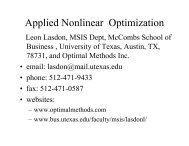[PDF] ALIO Back Matter
[PDF] ALIO Back Matter
[PDF] ALIO Back Matter
You also want an ePaper? Increase the reach of your titles
YUMPU automatically turns print PDFs into web optimized ePapers that Google loves.
SA13<br />
3 - Uncertainties in Corporate Greenhouse Gases Inventory:<br />
Methodology and Applications<br />
Gutemberg Brasil, UFES, Av. Fernando Ferrari, 514, Departamento<br />
de Estatística, Vitória, 29075-910, Brazil, ghbrasil@terra.com.br,<br />
Paulo António de Souza Júnior, João Andrade de Carvalho Júnior<br />
Corporate inventories of greenhouse gas emissions, as well as the biomass stock,<br />
contain relevant information for the decision makers at the private sector to support<br />
their policies related to climate change. A methodology for the calculation of<br />
emissions from processes and services is presented. This methodology includes the<br />
expressions of uncertainties associated to the calculation of greenhouse gas<br />
emissions. The importance of the knowledge of these uncertainties is also discussed.<br />
4 - The Efficiency of Preventive Maintenance Planning and the<br />
Multicriteria Methods: A Case Study<br />
Carlos Enrique Escobar-Toledo, Professor, National University of<br />
Mexico (UNAM), Circuito Institutos. Facultad de Química,<br />
Conjuntos D-E Room 310, Mexuco, 04510, Mexico,<br />
carloset@servidor.unam.mx, Edgar Sevilla Juarez<br />
The goal of this work considers process plants reliability to manage failure risks<br />
trough preventive maintenance. We propose the ranking of equipment according<br />
with a set of appropriate criteria for a better preventive maintenance planning,<br />
considering that it, is multicriterio by nature. To show how the methodology works,<br />
naphtha Hidrodesulfurating process plant is used as a case study. The results shows<br />
process equipment ranking to give preventive maintenance under budget<br />
constraints.<br />
5 - Comprehensive Indicators of Sustainable Development<br />
Viktorija Bojovic, Teaching Assistant, Faculty of Economics,<br />
9-11 Segedinski put, Subotica, 24000, Serbia-Montenegro,<br />
vbojovic@uns.ac.rs<br />
The concerns about accurate measure of long-term economic sustainability have<br />
resulted in myriad of indexes and specific measures. The necessity to reduce<br />
information overload of incomparable numbers by proliferating comprehensive<br />
indicators of sustainable development is paramount. Presenting possibilities of<br />
reducing information overload through generation of more relevant information for<br />
integrative long-term environment and economic planning and decision making is<br />
the purpose of the paper.<br />
■ SA14<br />
Aula 365- Third Floor<br />
Game Theory and Data Mining<br />
Cluster: Game Theory and its Applications<br />
Invited Session<br />
Chair: Richard Weber, Professor, University of Chile, Republica 701,<br />
Santiago, Chile, rweber@dii.uchile.cl<br />
1 - Strategic Costs in a Specific Location Mechanism to NIMBY<br />
Fernando Alexis Crespo Romero, Santiago, RM, Chile,<br />
facrespo@gmail.com<br />
NIMBY (Not In My <strong>Back</strong>yard) are facilities that are necessary to society, but rejected<br />
by communities that have to host them. We revised a mechanism for location<br />
decisions using auctions over costs declared by communities. This mechanism hasn’t<br />
the ideal conditions, but it maintains the ranking of true costs. For this mechanism<br />
we calculate the declared strategic costs for communities and compare our results<br />
with other classical results of strategic declarations in auctions mechanism.<br />
2 - Sequential Equilibria Algorithms for Adversarial Data Mining with<br />
Signaling Games<br />
Gaston L`Huillier, University of Chile, Republica 701, Santiago, Chile,<br />
glhuilli@dcc.uchile.cl, Richard Weber, Nicolas Figueroa<br />
In adversarial classification with signaling games, the equilibria finding problem is<br />
directly related to the performance of the classifier. However, equilibria refinements<br />
in incomplete information games has been widely recognized as a complex<br />
procedure. For this, different algorithms for the learning process of the strategic<br />
interaction between agents are proposed, improving the classifier’s performance and<br />
obtaining promising results in a phishing fraud detection environment.<br />
3 - Game Theory - Data Mining Model for Price Dynamics in<br />
Financial Institutions<br />
Cristian Bravo, PhD Candidate, University of Chile, Republica 701,<br />
Santiago, Chile, cbravo@dii.uchile.cl, Richard Weber,<br />
Nicolas Figueroa<br />
We present a two-stage model consisting on a hybrid support vector machines -<br />
neural network model to estimate market share (demands) for competing<br />
companies at a client level. The demands serve as input for a game theoretic model,<br />
which considers the strategic relationships between costs and demands when the<br />
companies decide prices. An application to real-life data provided useful insights<br />
about cost structures, the competitive behavior of the institutions, and the behavior<br />
of the customers.<br />
<strong>ALIO</strong> / INFORMS International – 2010<br />
26<br />
■ SA15<br />
Aula 351- Third Floor<br />
Data Mining for Decision Making I<br />
Sponsor: Data Mining: Knowledge Discovery and<br />
Data Mining for Decision Making<br />
Sponsored Session<br />
Chair: Louis Duclos-Gosselin, Applied Mathematics (Predictive Analysis,<br />
Data Mining) Consultant at Sinapse, Sinapse & INFORMS Data Mining<br />
Section, 1170 Boul. Lebourgneuf, Bureau 320, Quebec, QC, G2K2E3,<br />
Canada, louis.gosselin@hotmail.com<br />
1 - Inference in Large Dynamic Networks<br />
Shawndra Hill, Assistant Professor of Operations and Information<br />
Management, The Wharton School of the University of<br />
Pennsylvania, Philadelphia, PA, 19104, United States of America,<br />
shawndra@wharton.upenn.edu<br />
Telecommunications and social-network sites such as MySpace, Friendster and<br />
Facebook record data on explicit social networks. Online advertising firms are now<br />
linking these explicit networks to actions such as clicks and purchases. We combine<br />
explicit social network and purchase data to predict business outcomes. We find that<br />
explicit social network data are useful for predicting purchase above models that<br />
rely only on traditional attributes like demographics and geography.<br />
2 - Information-theoretic Approach to Data Mining<br />
Behlul Caliskan, Research Assistant at Marmara University,<br />
Marmara University, Faculty of Communication, Nisantasi Campus,<br />
Sisli / Istanbul, Turkey, behlul.caliskan@marmara.edu.tr<br />
Because a database may be considered as a statistical population, and an attribute as<br />
a statistical variable taking values from its domain, data mining tasks may be<br />
approached using information-theoretic techniques. Many information-theoretic<br />
measures have been proposed and applied to quantify the importance of attributes<br />
and relationships between them. In this paper, the information-theoretic techniques<br />
used applied DM tasks will be analyzed and some recent applications will be<br />
mentioned.<br />
3 - Predictive Analysis (Data Mining) Implementation: Predicting Fraud<br />
in E-Commerce Transaction Data<br />
Louis Duclos-Gosselin, Applied Mathematics (Predictive Analysis,<br />
Data Mining) Consultant at Sinapse, Sinapse & INFORMS Data<br />
Mining Section, 1170 Boul. Lebourgneuf, Bureau 320, Quebec, QC,<br />
G2K2E3, Canada, louis.gosselin@hotmail.com<br />
Starting from earlier e-commerce management sciences studies, managers have<br />
always tried to find better techniques to effectively manage e-commerce operations<br />
in order to reduce the costs while increasing customers’ satisfaction. This paper<br />
shows how managers can use predictive analysis to address fraud detection<br />
problems. A new predictive analysis technique for solving problems related to fraud<br />
detection is presented. The technique has been tested on two web transaction<br />
anomaly data.<br />
■ SA16<br />
Aula 385- Third Floor<br />
Heuristics<br />
Contributed Session<br />
Chair: Claudia Fink, Universidade de São Paulo - USP, Av. Trabalhador<br />
São-carlense, 400, São Carlos, SP, 13560-970, Brazil,<br />
claudiaf@icmc.usp.br<br />
1 - Improving Service Level of the Public Safety: A Proposal Based on<br />
Tabu Search and p-median Model<br />
Rodrigo Ferreira, UFRN, Caixa Postal 1551, Lagoa Nova, Natal, RN,<br />
59078-970, Brazil, rodjpf@gmail.com, Dario Aloise, André Gurgel<br />
Criminality is a relevant problem to be dealt by public safety systems. This work<br />
proposes a model to support police units allocation. This model combines p-median<br />
model and travelling salesman problem to define regions, travel distance and<br />
operational cost. It aims enhance coverage, reduce operational costs and increase<br />
service level.<br />
2 - Heuristics Based on LB and VNS to Solve Lot Scheduling<br />
Formulations for the Beverage Production<br />
Deisemara Ferreira, Federal University of São Carlos, Rua Chicrala<br />
Abrahao, 320, São Jose do Rio Preto, Brazil, deise@dep.ufscar.br,<br />
Reinaldo Morabito<br />
In this work we applied heuristics based on local branching, VNS and other<br />
strategies to solve formulations of lot sizing and scheduling problems, in the<br />
beverage industry. The results are compared to solutions in the literature, as well as,<br />
an actual production scheduling of a company.


![[PDF] ALIO Back Matter](https://img.yumpu.com/17932960/6/500x640/pdf-alio-back-matter.jpg)
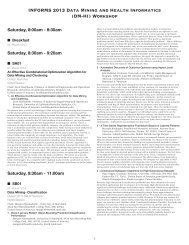
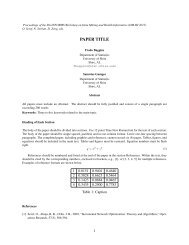
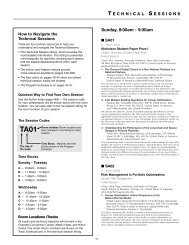
![[PDF] Charlotte Back Matter](https://img.yumpu.com/17933057/1/190x245/pdf-charlotte-back-matter.jpg?quality=85)
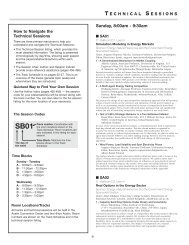
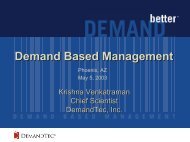
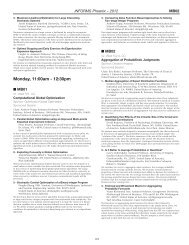

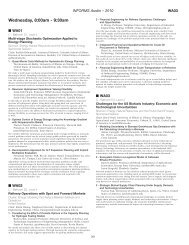
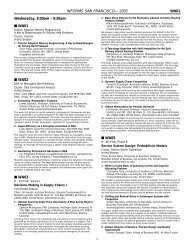
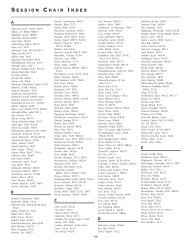
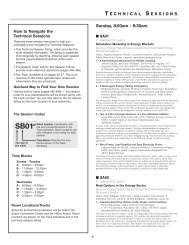
![[PDF] Monday, 8:00am - 9:30am](https://img.yumpu.com/17932954/1/190x245/pdf-monday-800am-930am.jpg?quality=85)
